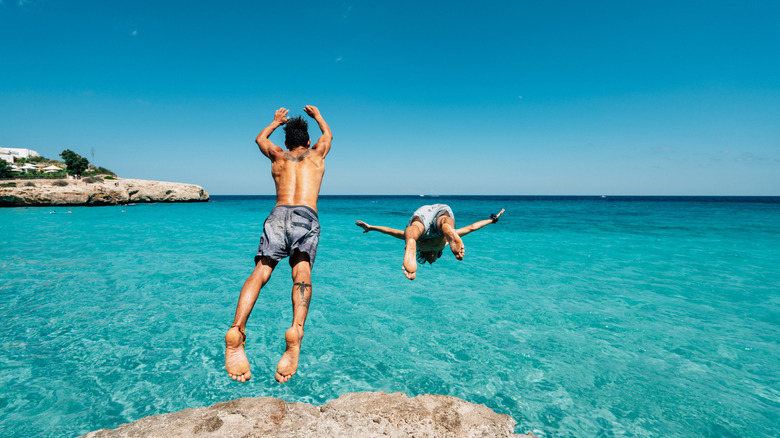The Caribbean is the stuff dream holidays are made of. After all, this spectacular region boasts some incredible islands with breathtaking beaches, impossibly clear waters, and a wealth of diverse cultures and cuisines. However, even the most idyllic trips can unravel if you’re not savvy about the dos and don’ts. It’s easy to slip up in paradise, from misunderstanding local customs to falling for tourist traps and underestimating the power of the midday sun. First-time travelers might find it challenging to navigate unexpected complications if they’re not well prepared.
If you want to get the most out of your Caribbean escape, it pays to research before you go. Many mistakes are completely avoidable if you’re aware of them. For example, overlooking local customs and etiquette can lead to awkward situations, while sticking only to popular tourist areas might mean missing out on authentic and memorable experiences. To ensure you don’t come home from the Caribbean with regrets, these are some common mistakes to avoid.
Not researching the different islands
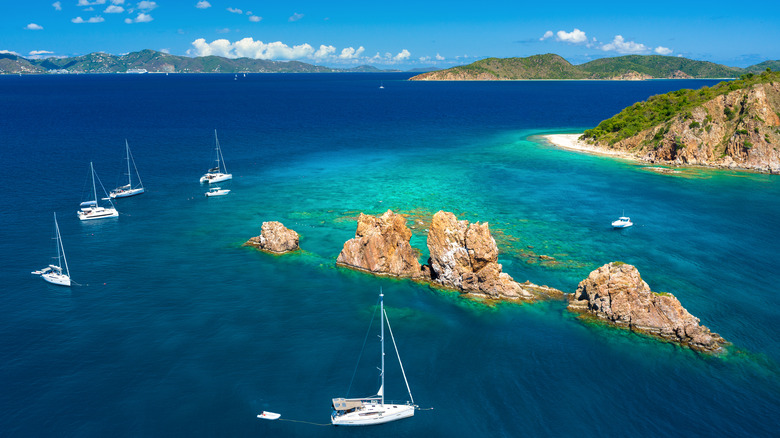
One major mistake people make when planning a Caribbean vacation is assuming all the islands are the same. The Caribbean is a vast region with 13 countries, numerous territories, and thousands of islands. Each country and territory has its own culture, landscapes, and vibe. Visit Jamaica, and you’ll find lush jungle-covered mountains, while the Turks and Caicos islands are flat and relatively dry. The glitzy resorts of St. Barts are quite different from the humble homestays in Cuba.
It’s worth researching which Caribbean destination best suits your traveling style or expectations. Consider your budget, what type of accommodation you prefer, and what activities you would like to do on your vacation. Look into the entry requirements, as you’ll need a passport to visit most places (for Americans, the U.S. Virgin Islands and Puerto Rico are exceptions). You can also take some cruises without a passport, but it’s best to check with the cruise line first. And speaking of cruises, don’t presume that every excursion will be the same. Every port of call offers something new to discover.
Expecting everyone to speak your language
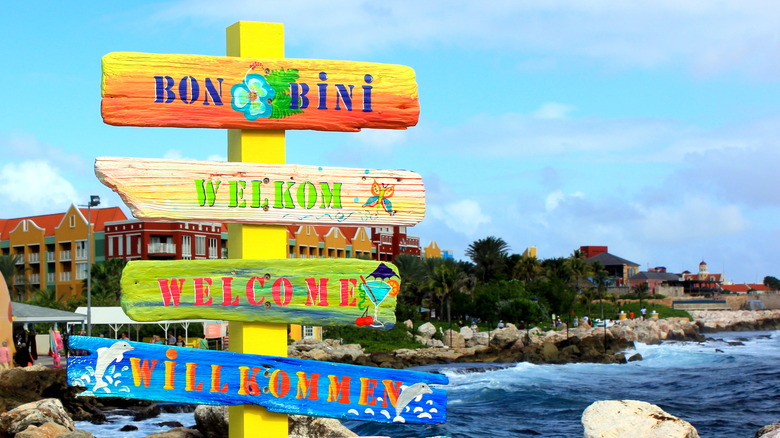
While English is the lingua franca in some Caribbean countries, for others, it’s Spanish, French, or Creole. There are six official languages in the Caribbean: Spanish, French, English, Haitian Creole, Dutch, and Papiamentu. If you’re traveling to a country where the primary language is different from your own, don’t expect everyone to be able to communicate in yours. Outside the resorts and tourist areas, you might encounter some language barriers.
As mentioned above, it’s useful to research your destination to know what to expect when you arrive. If you’re planning on visiting a country where people speak a different language than you, it helps to learn some common phrases. At the very least, you should know how to say simple words and phrases like “hello,” “yes,” “no,” “please,” and “thank you.” The locals will likely appreciate the effort, even if you mangle the words. If you’re not confident in your language skills, consider downloading a translation app to make communication easier.
Assuming swimwear is acceptable attire everywhere
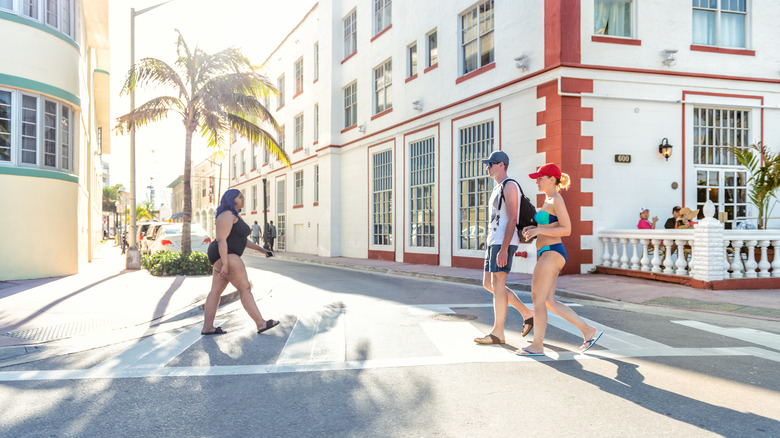
Andriy Blokhin/Shutterstock
Just because you’re on holiday doesn’t mean everyone else in your destination is, too. If you plan to leave the resort, assume that clothing is mandatory in most business places and public areas. Yes, the islands can be laid-back and easy-going, but many Caribbean cultures are conservative when it comes to dressing. Many local people wouldn’t dream of stripping down to their swimwear unless they’re going swimming. Prancing around in a skimpy bikini or going shirtless outside of the beach or pool deck probably won’t earn you much respect from the locals.
In some Caribbean countries, you can even be fined or thrown in jail for dressing inappropriately. Grenada has an indecent exposure law that bans swimwear away from the beach. The penalty is a $270 fine or six months of jail time. Another type of clothing to avoid wearing in public is anything camouflage. In most Caribbean nations, it’s illegal to wear camouflage because governments want to avoid confusion with military personnel. This includes Saint Lucia, Jamaica, Grenada, Barbados, and The Bahamas, to name just a few.
Forgoing the festivals

Aleksandr Rybalko/Shutterstock
The Caribbean is renowned for its vibrant festivals celebrating local culture, history, and traditions. Carnival in the Caribbean is believed to have originated in Trinidad during the 18th century. During this time, the French colonists did not allow enslaved people to attend celebrations on the island, so the slaves created their own festivals. Many of these celebrations involved music and dance with African roots and costumes that mocked the colonizers. The traditions spread throughout the Caribbean, with each island adding its own unique twists and nods to the islanders’ experiences and histories.
Today, most islands in the Caribbean have annual festivals with fabulous parades, music, and costumes. From the iconic Trinidad Carnival with its spirited masquerade parties to the Crop Over Festival in Barbados with its calypso competitions, these celebrations are a lot of fun and a major point of pride for local people. It’s worth looking into whether a festival is taking place around the time you’re considering traveling. It could be the highlight of your trip and a once-in-a-lifetime experience.
Only considering all-inclusive resorts
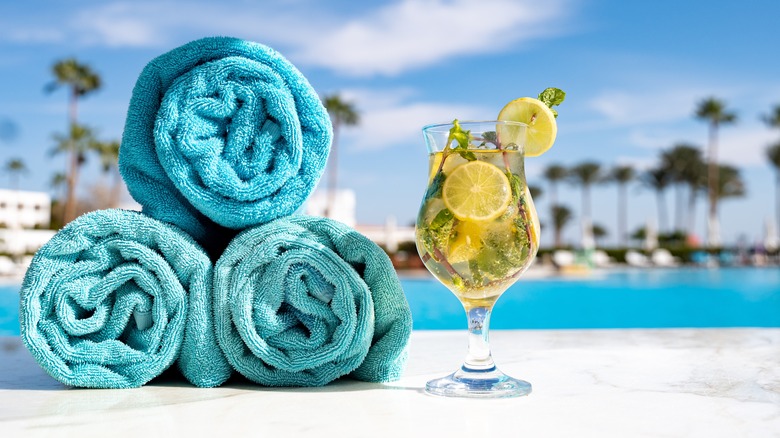
Ell_lial6/Shutterstock
All-inclusive resorts definitely have their benefits. For one, you don’t have to worry about paying for meals or drinks. The resort packages can also be very cost-efficient. Then, there’s the convenience of having everything in one place, from the pool to the restaurants, beach access, and planned daily activities. However, for all the advantages, there are also many reasons why an all-inclusive resort may not be the best way to experience the Caribbean.
Because of their popularity, all-inclusive resorts can be very crowded. You’ll likely have to share the beach and pool with numerous other travelers. In addition, all-inclusive are not typically known for their amazing fare. Buffets are often the norm, and local dishes tend to be toned down to appeal to delicate palates. Plus, these types of resorts can be just plain soulless. You may find that independent properties and vacation rentals offer more comfort and privacy and provide a unique view of the island you’re visiting. If you decide to go all-inclusive, try to get off the resort at least a few times to experience a more authentic side of your destination.
Overdrinking

oneinchpunch/Shutterstock
It’s natural to want to let your hair down a bit on a holiday, but getting obscenely drunk is never a good look. When you’re staying at a resort where all your drinks are included, it’s easy to overdrink. Too many people fall into the trap of losing count of how many drinks they’ve had at the resort and end up paying for it later. And there’s nothing more soul-crushing than sacrificing a precious vacation day for a hangover from hell.
Besides the dreaded hangover, there are a number of reasons to be mindful of how many alcoholic beverages you’re consuming on your Caribbean vacation. First, the combination of alcohol and heat can be doubly dehydrating. Alcohol is a diuretic, so it encourages the body to flush fluids quickly. The heat also causes your body to expel fluids via the sweat glands. Secondly, drinking alcohol in the hot sun can put a strain on your cardiovascular system. If you want to stay in top shape, be mindful of how many drinks you consume and supplement your cocktails with water.
Neglecting hurricane season
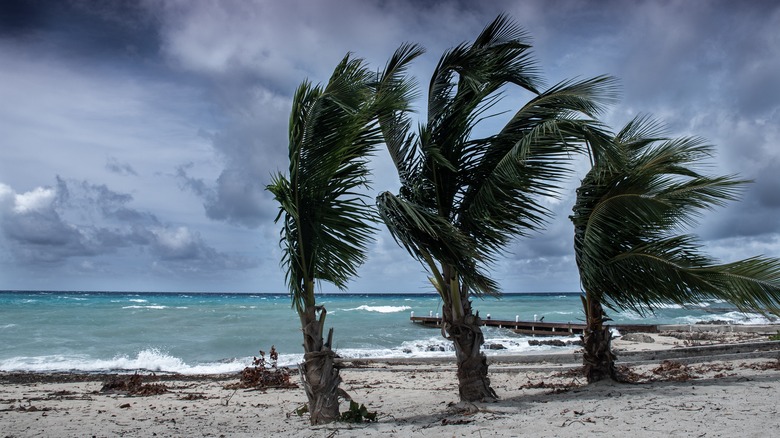
Drew McArthur/Shutterstock
When you picture the Caribbean, you probably think of gorgeous sunny weather. That may be a reality at certain times of the year, but hurricane season can be a different story. The Caribbean sits in the center of a hurricane belt, so it can experience some pretty gnarly storms. The hurricane season typically takes place from June to November. This is something to consider when traveling to the region. On the one hand, prices can be much lower at this time of year. On the other hand, you may get stranded or find yourself in the middle of a massive storm.
If you decide to take the risk and travel to the Caribbean during hurricane season, travel insurance is essential. Check with your provider to see what your travel insurance covers during a hurricane. In some cases, travel insurance can cover non-refundable costs like canceled flights or hotel bookings. Some providers also offer emergency assistance for travelers abroad. Then there is the medical coverage, which can be a huge money saver if you get injured during a storm.
Underestimating the power of the sun
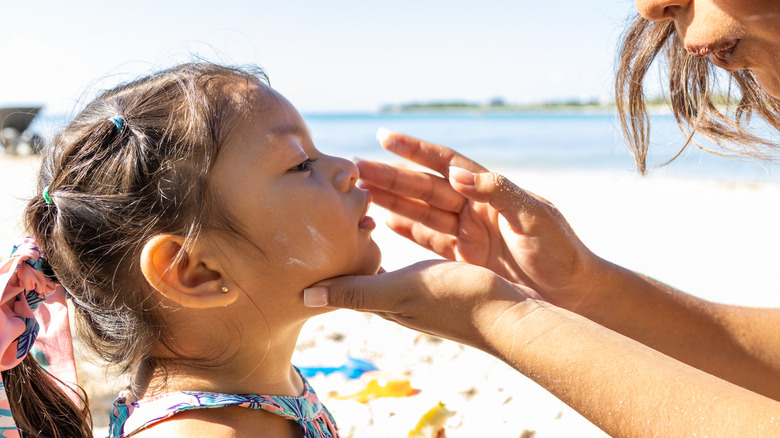
Mstudioimages/Getty Images
If getting a glorious tan is one of your Caribbean getaway goals, just be warned that the sun can be fierce in this corner of the world. The Caribbean islands lie closer to the equator than most of North America and Europe, so UV exposure can be significantly higher. The sun can be especially punishing between 10 a.m. and 4 p.m., probably when you’re lying on the beach or next to the pool. You might think you don’t need to put too much sunscreen on, but skip this step, and before you know it, you could be in a world of pain.
The best way to avoid a nasty sunburn is to apply sunscreen liberally and often. The American Academy of Dermatology suggests using a water-resistant, broad-spectrum sunscreen with an SPF of 30 or higher and reapplying it every two hours after sweating or swimming. You may also want to seek shade during the hottest time of day. Keep in mind, though, that you can still get burned from the reflection of the sun off the sand and water. Also, note that UV rays can penetrate clouds, so wear sunscreen on cloudy days.
Not getting off the beaten path
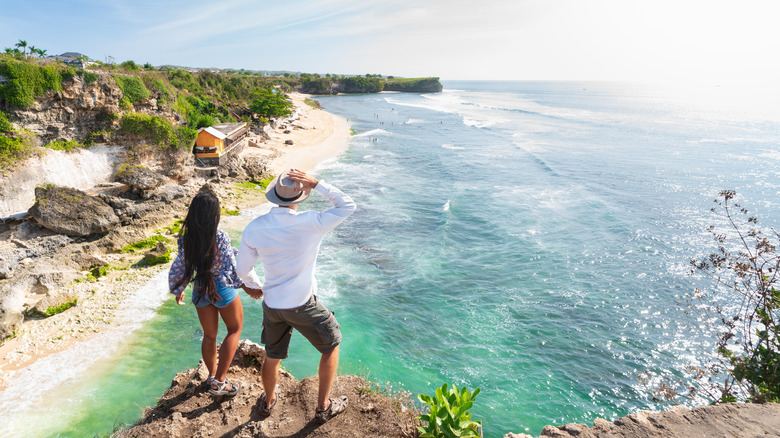
Cocos.Bounty/Shutterstock
There’s nothing wrong with visiting tourist sites. Many of them can offer fascinating glimpses into the history or culture of your destination. However, you may find that you can learn so much more about a place by simply exploring beyond the well-trodden sites. From hidden waterfalls to traditional villages and roadside food shacks, there are so many places that the guidebooks don’t tell you about that can offer amazing experiences.
Another advantage of venturing off the beaten path is that you can engage more meaningfully with local communities and better understand their way of life. This could mean joining a village festival, experiencing a traditional dance performance, or having a heartfelt conversation with a local artisan. Plus, by supporting local businesses and artisans, you contribute directly to the community’s economy, which helps to sustain their cultural heritage and livelihoods. There’s so much more to the Caribbean islands than the resort grounds and packaged excursions. It just takes a little exploring to uncover those hidden gems.
Buying into stereotypes

Nastasic/Getty Images
Just like no two islands in the Caribbean are the same, no two people you meet on your travels will be alike. There’s nothing more annoying to locals than tourists assuming that everyone from the Caribbean region listens to reggae, smokes ganja, and spends their days lying in a hammock beside the beach. Don’t assume that all islanders are uneducated or that they all work in the hospitality industry. It’s an incredibly diverse region not just in terms of landscapes but also cultures, racial backgrounds, religions, languages, foods, and socio-economic positions.
One of the most common misconceptions that can actually get you into a lot of trouble is that everyone smokes weed or is accepting of it. Digna Joseph puts it pretty succinctly in her article on Medium, “For many whose only perception of the Caribbean islands is probably listening to Bob Marley’s music and seeing images of the legend with a stick of cannabis in hand, it makes sense that they would assume the drug is legal and acceptable across the region.” However, that’s far from the truth: Marijuana is illegal in some Caribbean countries, like Trinidad and Tobago and Grenada, and in others, for example, Saint Lucia and Barbados, it’s only legal in small, specified doses.
Forgetting to tip
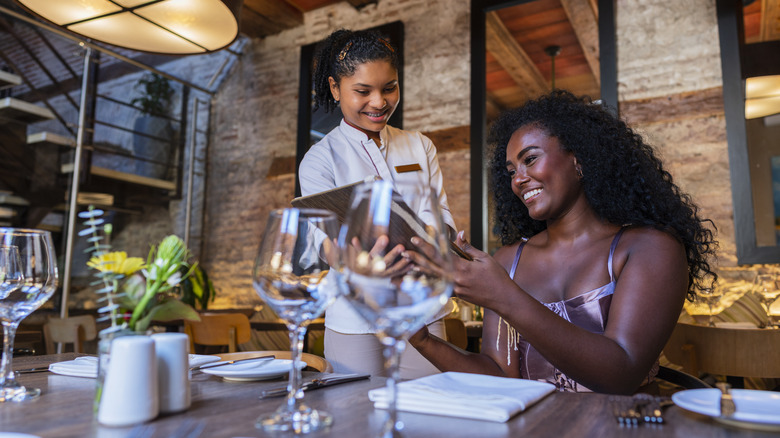
Mario Arango/Getty Images
Tipping is much appreciated and often expected in the Caribbean. Wages throughout the region can be low compared to many other countries, so many people in the hospitality and service industries depend on tips to supplement their income. If the service was good, it’s common practice to leave 15% to 20%. This includes restaurant servers, bartenders, spa therapists, and taxi drivers. It’s common for hotel porters to receive $1 or $2 per bag. Just be aware that some restaurants will automatically add a service charge to your bill, so you might want to check first before you tip twice.
If you’re staying at an all-inclusive resort, it can be difficult to know the etiquette when tipping. Some resorts, like Sandals and Beaches, include tips and gratuities in the cost of your vacation package. Even so, you may still want to tip some staff, like butlers, massage therapists, or tour guides. If gratuities aren’t included in the package price, you should tip at an all-inclusive resort. This includes housekeepers, concierges, drivers, servers, and bartenders. You can tip them as you go or all at once. A good rule of thumb is to budget about $150 to $200 weekly for tips.
Not trying the local food
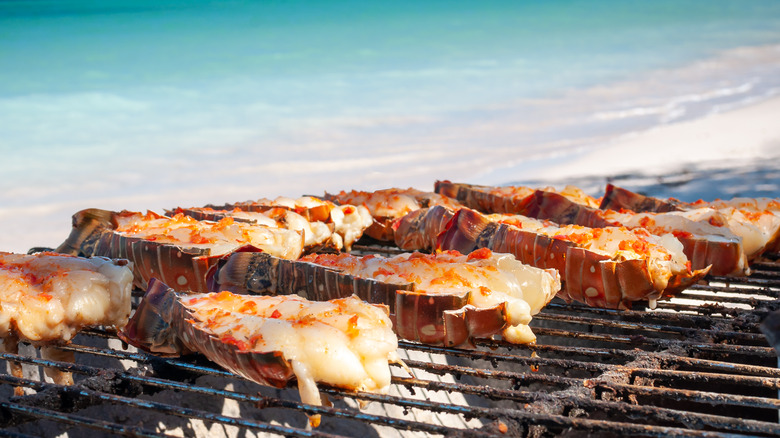
Nichola Chapman/Shutterstock
One of the best ways to experience a travel destination is through the food. Every island in the Caribbean has its own unique dishes and variations of regional delicacies, and it’s worth getting out of the resort to try a few. There’s nothing like eating freshly cooked seafood with your toes in the sand or savoring roast chicken straight off the grill with the aromas of the smoke wafting through the air. Plus, it will give you a chance to meet new people and discover new culinary techniques that you can add to your cooking repertoire.
You’ve probably heard of or tried some of the more popular dishes from particular Caribbean islands, like jerk chicken from Jamaica or Cuban sandwiches. However, plenty of lesser-known dishes are just as flavorful and worthy of adding to your foodie bucket list. Callaloo is a vibrant vegetable stew popular in Trinidad and Tobago, Jamaica, and Dominica. Conch is a favorite local dish in the Bahamas and Turks and Caicos, and it’s often deep-fried until crispy and golden. Goat stew is popular across the region and makes for a spicy, savory, and decadent meal.
Depending solely on credit cards
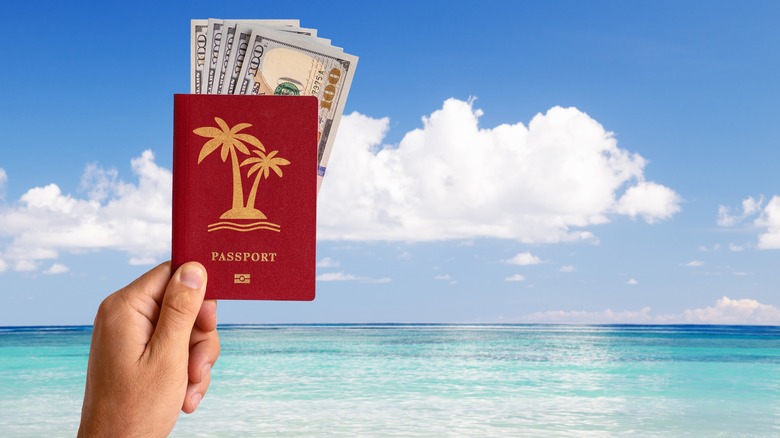
Barillo_Picture/Shutterstock
If you live in North America or Europe, carrying cash may be a thing of the past. Nearly everything can be paid for online or with a card. That’s not necessarily the case in some Caribbean destinations. While credit cards are accepted on many Caribbean islands, don’t expect that you can use your card everywhere. Some businesses may only accept cash or prefer cash payments. This is because many banks charge fees to process credit card payments, so some business owners may forgo them altogether.
It’s smart to bring some cash with you on your trip to the Caribbean for cash-only establishments, tips, and emergencies. Most businesses and vendors will accept American dollars and give you the change back in local currency. Avoid bringing large bills, as some people might not take them. In addition, be aware that exchange rates might not be great at local shops and restaurants, so you may want to consider changing your money at an official bank or money changer when you arrive. You can also take out local currency at ATMs.
Not chatting with the locals
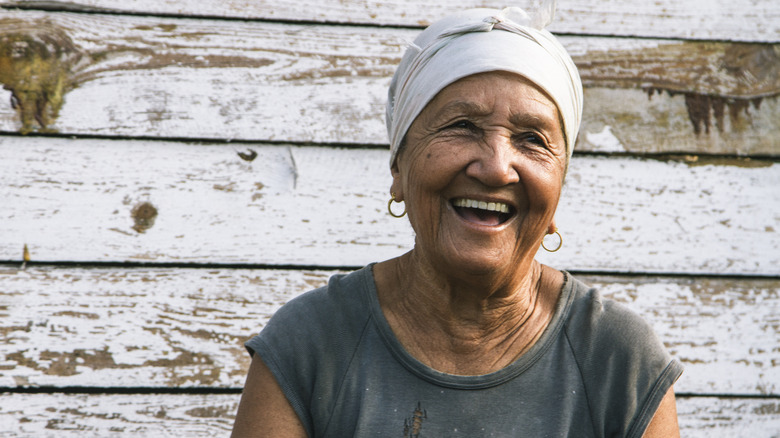
Julieannebirch/Getty Images
It’s easy to get stuck in a travel bubble where you only interact with your travel companions or the people at your resort. But the locals are the ones who can tell you where those secret scenic spots are or which places to hit up for the best fish on the island. Plus, they can give you valuable insight into what life is really like on the islands and teach you about local customs, history, and traditions. A simple hello can open up so many doors.
In many Caribbean cultures, it’s considered rude not to say hello to people. For example, in St. Maarten, Jamaica, and St. Croix, you should always greet someone with a “Good morning,” “Good afternoon,” or “Good evening” before asking a question or making a request. You should also acknowledge people you pass on the street with a friendly greeting. You’ll probably find that most people are friendly and happy to chat with you, provided you’re polite and respectful.

